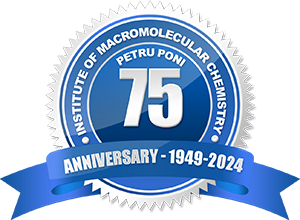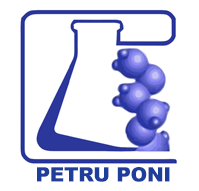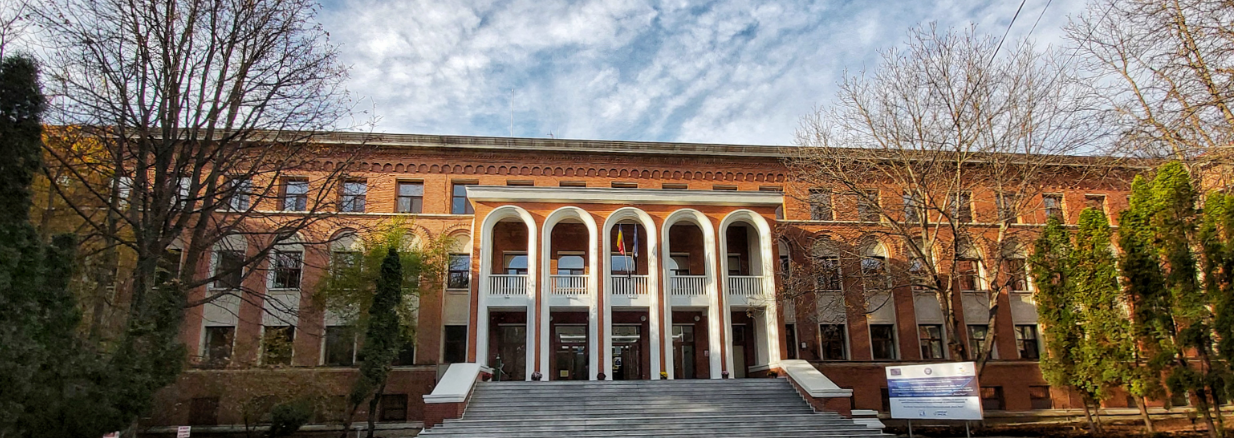|
|
Doctoral studies
| Acad. Bogdan C. SIMIONESCU Details
Field of Research: Polymer Physics
• Evaluation of relaxation phenomena in polymers
• Advanced thermal analysis methods (Modulated THA, modulated DSC, sample-controlled thermal analysis
• Applications of polyelectrolyte solutions in the wastewater purification
Proposed PhD theme:
Molecular mobility phenomena in polymeric structures that govern the resilience of polymers in real-life functioning and their long-time behaviour
Contact:
E-Mail: bcsimion@icmpp.ro
Phone: +40 332.880.550 ext. 104
|
| Dr. habil Maria Bercea Details
Hybrid materials based on polymers, proteins or peptides: preparation, properties, and applications
Bioinspired materials are able to mimic the salient features found in biological systems to self-repair the internal damages which occur during their use and to restore the former properties and functionality. The design of self-healing hybrid materials based on polymers, proteins or peptides represents an alternative approach for specific applications, extending the life span and reliability of materials by complete damage prevention.
The aim of this study is to develop by physical or chemical methods autonomous polymers/protein or polymer/peptide (extrinsic self-healing) composites with reversible behavior under extreme stress conditions. Some additives (intrinsic self-healing agents) will be also explored for improving the inherent healing functionality of polymer matrix by increasing the mobility so that the intermolecular interactions can exhibit. The damage parameters versus self-healing response will be followed experimentally through measurable properties, such as changes in the viscoelastic moduli or viscosity during multiple using/healing cycles, simulating the practical conditions in which the material works.
The polymers and materials will be studied from thermodynamic point of view, in order to know the types of interactions developed in the selected systems (the infrastructure is available in our laboratory). The main interest is to design biomaterials as hydrogels or porous membranes for tissue engineering and regenerative medicine. The network structure will be investigated by different methods available in Petru Poni Institute of Macromolecular Chemistry. The rheological behavior of all systems will be deeply investigated under different flow conditions (the infrastructure is available in our laboratory). The optimal formulations that lead to obtaining suitable materials required in the targeted applications will be established. The self-healing efficacy in terms of structure and mechanical strength recovery will be evaluated following several cycles of stress and self-healing.
The research topic is addressed to chemical engineers, chemists, biochemists, physicists or graduates with knowledge in the field of polymers and materials.
Contact:
E-Mail: bercea@icmpp.ro
Phone: +40 332.880.550 ext. 246
|
| Dr. Maria Cazacu Details
Field of Research:
Chemistry - Coordination compounds/polymers and materials based on them with multiple applications
Research aims to design and synthesize compounds and materials adaptable to stimuli, whose properties can be influenced, in a very specific and predictable manner, when exposed to a predefined stimulus. The aim is:
- Synthesis of chemical compounds with bistable molecules (with cis-trans isomerization, tautomerism or spin transition) or able to develop reversible interactions at the supramolecular level;
- Advanced characterization and evaluation of the ability of compounds to respond to various external stimuli;
- Incorporation of switchable molecules in polymeric matrices for the development of easily manipulable stimuli responsive macrosystems;
- Preliminary approaches for evaluating their applicability in practical areas of interest.
Proposed PhD themes:
- Molecular switches and materials based on them
Contact:
E-Mail: mcazacu@icmpp.ro
Phone: +40 332.880.550 ext. 116
|
| Dr. habil Sergiu Coseri Details
Field of Research:
Soft bioelectronics
Soft bioelectronics is a fast-growing interdisciplinary research field that takes advantage of soft materials and electronic devices for the applications at the interface of biology and electronics.
As flexible devices, soft bioelectronics that inspired by living creatures from unicellular organisms to humans can achieve various actuation movements such as bending, contracting, rolling, and crawling, which have shown promising applications in the fields of soft robots, artificial muscles, and tissue engineering. Recently, stimuli-responsive polymers have been widely harnessed to fabricate soft actuators, due to their remarkable superiority of special functions in response to external conditions.
Taking advantage of the abundance of natural polymers such as cellulose, alginate, starch, etc, we aim to develop by ingenious chemical procedures new cutting-edge of such highly demanded devices.
The potential candidate would benefit from working in a pleasant, friendly environment in a group with world priorities in the field of polysaccharide functionalization reactions. Moreover, the proposed topic represent a first at the national level.
Proposed PhD themes:
- Nature-inspired strategies for soft bioelectronics production.
Contact:
E-Mail: coseris@icmpp.ro
Phone: +40 332.880.550 ext. 143
|
| Dr. habil Dana Damaceanu Details
Field of Research:
The main research interest is focused on the design, synthesis and engineering of exciting practical materials based on (hetero)aromatic/heterocyclic oligomers or polymers for (opto)electronic and energy applications. To this aim several activities are foreseen, among the most important are as follows:
- Preparation of (hetero)aromatic/heterocyclic monomers, oligomers or polymers by fine chemistry synthetic tools, their structural identification and physico-chemical characterization
- Processing the organic compounds into well-defined advanced materials and their multifunctional properties investigation
- Assessing the applicative potential and testing the synthesized materials in various electronic devices, e.g. solar cells, light-emitting diodes, electrochromic devices, supercapacitors, etc.
Proposed PhD theme:
- (Hetero)aromatic polymers containing electroactive units
- Composite materials based on heteroaromatic polymers
Contact:
E-Mail: damaceanu@icmpp.ro
Phone: +40 332.880.550 ext. 141
|
| Dr. habil Maria Valentina DINU Details
Field of Research:
Single- and multi-component cross-linked polymeric systems based on synthetic or/and natural polymers which are structured and organized into complex architectures, as follows:
• Hydrogels/cryogels prepared by conventional methods, ice-templating (cryogelation) and/or leaching techniques with applications in environmental protection (removal of heavy metal ions, dyes, pesticides), medicine (drug delivery, tissue engineering), and food industry;
• Micro-/nanocompartments entrapping enzymes or antioxidants as catalytic tools for environmental, biomedical or food applications;
• Ion exchangers and organic-inorganic composites as sorbents for the removal of contaminants from industrial wastewaters.
Proposed PhD themes:
- Development of novel specific composite biosorbents for sustainable applications in waste minimization and circular economy
- Superabsorbent cryogels for application in agriculture as soil moisture conditioners and nutrient carriers
- Design of new functional materials with potential applications in medicine and food industry
Contact:
E-Mail: vdinu@icmpp.ro
Phone: ext. 141
|
| Dr. habil Gheorghe Fundueanu Details
Field of Research: Biomedical applications of polymers
- Synthetic and natural polymers, chemically modified, with complex architectures, for the controlled release of drugs, for the “targeting” of drugs, as biomimetic supports for the engineering (regeneration) of different tissues (bone, muscle, epithelial, etc.) or for other biomedical and biotechnological applications (flocculation, purification, enzyme immobilization, etc.).
- Systems with controlled delivery of drugs (self-regulated), based on polymers sensitive to external stimuli, which release the drug when normal physiological conditions are disturbed. Obtaining micro- and nano-particles in suspension or colloidal solutions from synthesized polymers.
- Design, production and testing of new polymers / polymer matrices with complex structures used for biomedical and biotechnological applications.
Proposed PhD themes:
- Synthesis and characterization of hydrogels from synthetic and natural polymers for controlled release of drugs or other biomedical applications
- Micro- and nano-particles used as delivery systems for: water soluble and insoluble drugs; DNA in gene therapy; proteins, hormons, etc.
- Biomimetic and bioresponsive materials based on smart polymers for self-regulated drug delivery or other biomedical and biotechnological applications
- Polysaccharides and chemical modification of polysaccharides for biomedical applications
Contact:
E-Mail: ghefun@icmpp.ro
Phone: +40 332.880.550 ext. 155
|
| Dr. habil Luminita Ghimici Details
Field of Research:
Polyelectrolytes
- Synthesis and characterization
- Study of the physico-chemical properties of polyelectrolytes solutions
- Applications of polyelectrolyte solutions in the wastewater purification
Proposed PhD theme:
- The impact of molecular and medium parameters on the behavior of polyelectrolytes in solution and on their ability to interact with a wide range of particles/contaminants of inorganic and organic nature
Contact:
E-Mail: lghimici@icmpp.ro
Phone: +40 332.880.550 ext. 256
|
| Dr. habil Corneliu Hamciuc Details
Field of Research: Multifunctional polymer systems based on organic compounds containing phosphorus and/or nitrogen.
- Synthesis and study of novel polymer structures with phosphorus and/or nitrogen atoms, having potential applications in biomedical field or in increasing the fire resistance of traditional polymeric materials.
- Preparation of polymer composites based on inorganic compounds with improved thermal, electrical, optical and magnetic properties.
Proposed PhD themes:
- Polymer composites containing organophosphorus compounds with tunable properties for multifunctional advanced materials.
- Polymer systems based on polyethers/polyetherketones for performance materials with thermal, optical and dielectric properties.
Contact:
E-Mail: chamciuc@icmpp.ro
Phone: +40 332.880.550 ext. 334
|
| Dr. Valeria Harabagiu Details
Research topic:
- Polymeric nanocomposites for magnetic resonance imaging
Clinical testing based on magnetic resonance imaging (MRI) requires the use of contrast agents able to provide high resolution images. Commercially approved products contain either gadolinium cations or iron oxide nanoparticles. To improve the resolution, the doping spinel ferrites with rare earth cations should be considered, as this approach was already proved to decrease magnetic particle dimensions and to increase the magnetization. On the other hand, to reduce the toxicity and to provide specific accumulation of the contrast agent into tumor regions they should be covered by a biocompatible polymeric shell (e.g., polysaccharide), eventually conjugated with specific recognition agents.
PhD thesis objectives:
- To design and prepare composite nanoparticles of low dimensional polydispersity, high magnetic properties and reduced toxicity
- To follow preparation / structure / physico-chemical property relationships of the prepared nanosized materials
- To prove their biological properties and imaging performances
Contact:
E-Mail: hvaleria@icmpp.ro
Phone: +40 332.880.550 ext. 101
|
| Dr. Aatto Laaksonen Details
Proposed PhD theme / Field of Research:
Artificial Intelligence in Computational Chemistry
As AI technologies continue to evolve, they become also more and more integrated within Computational Chemistry. In this PhD project artificial intelligence (AI) methods are introduced to improve the performance and accuracy in a broad range of numerical and theoretical applications, from the development of predictive molecular and chemical models to data mining and screening, as well as interpretation, and verification of modeling and simulation data with corresponding experimental findings.
The project starts by focusing on the development of AI models in Quantum Chemistry and molecular simulations. We will design algorithms that can predict chemical properties and behaviors, going beyond traditional computational methods in both speed and precision. This involves training AI models on large datasets to learn complex chemical interactions in the discovery of new materials and drugs as examples. The project involves data mining and screening AI tools are used to filter through extensive chemical databases, identifying patterns and relationships that human researchers cannot detect. This helps to uncover novel compounds and reaction pathways, reducing the time and cost compared to current traditional methods.
In more details the project goes into Machine Learning (ML) and Deep Learning algorithms for predictive modelling using various neural networks, regression models and decision trees to forecast molecular interactions, reaction outcomes, material properties, and in drug discovery to predict the efficacy and safety profiles of potential drug candidates. The project teaches basic chemoinformatics such as data mining, screening and pattern recognition using clustering algorithms, principal component analysis, and others.
Requirements: MSc or corresponding exam in Chemistry, Physics, Chemical Engineering, Biotechnology, Informatics, etc. Some programming skills are necessary but can be caught up during the project.
Contact:
E-Mail: laaksonen.aatto@icmpp.ro
Phone: +40 332.880.550 ext. 554
|
| Dr. Luminita Marin Details
Field of Research:
The research domain is focused on new eco-materials for applications of contemporary interest, mainly based on the chitosan biopolymer and/or phenothiazine heterocycle. The research activities are directed to the synthetizes of new compounds and preparation of materials based on them, with a specific design targeting applications in medicine, environmental protection, agriculture and optoelectronics. More specific, the new chitosan derivatives are manufactured as (i) films, hydrogels, nanofibers, nanoparticles and various formulations by in situ encapsulations of drugs or agents for soil conditioning and the new phentothiazine derivatives are manufactured as (ii) films, nanocrystals, cocrystals, fibers and micelles.
Proposed PhD themes:
- Water soluble chitosan derivatives for biomedical applications
The aim of the study is (i) to synthetize chitosan water soluble derivatives by grafting polycarbonate chains and/or quaternary salts and (ii) to manufacture them as materials suitable for in vivo applications, such as hydrogels, nanoparticles and nanofibers.
- Synthesis of imino-chitosan derivatives in heterogeneous system for biomedical applications
The aim is to prepare porous chitosan nanofibers by electrospinning technique and further to functionalize them by imination reaction with bioactive aldehydes, to increase their potential for the treatment of chronic injuries and burns.
- Nanoparticle formulations based on chitosan for controlled drug release
The aim is to prepare chitosan based nanoparticle loaded with drugs in order to establish effective formulations for controlled delivery of acetaminophen and erythromycin.
Contact:
E-Mail: lmarin@icmpp.ro
Phone: +40 332.880.550 ext. 134
|
| Dr. habil Marcela Mihai Details
Field of Research: Multifunctional (composite) materials, obtained by synthesis and/or use of a wide range of synthetic and natural ionic polymers, with predetermined functional groups and architectures.
• Development of complex nanostructured materials (composites)based on natural/synthetic polymers with ionic/ionizable functional groups, with increased selectivity for certain molecule and/or ionic species; Development of new multifunctional supramolecular architectures obtained by physical or chemical association of self-assembled systems.
• Complex (composite) materials with applications in medicine and in environmental protection:Materials with intrinsic antimicrobial activity; Dosing and controlled drug delivery systems; Specialized/specific sorbents for the removal of organic and inorganic priority pollutants from simulated and real waters.
Proposed PhD themes:
• Eco-friendly polymer composites containing polyssacharides derivatives
The proposed PhD theme aims to explore and extend the field of environmentally friendly materials, by developing new methods to obtain polysaccharides derivatives with improved and intrinsic antimicrobial activity, with wide application both in medicine and in water cleaning.
• Specialized ion exchangers for agriculture applications
Ion exchange is one of the main mechanisms by which the soil retains and makes available to plants and microorganisms elements such as calcium, magnesium, potassium, ammoniacal nitrogen. Within this doctoral topic, ion exchangers with different functional groups will be synthesized and will be tested their influence on the soil fertility index.
Contact:
E-Mail: marcela.mihai@icmpp.ro
Phone: +40 332.880.550 ext. 149
|
| Dr. habil Loredana Nita Details
Field of Research: Polymeric systems for bio-applications: functional compounds and (nano)structured interpenetrated networks
- Synthesis and characterization of polymeric network based on natural/synthetic polymers with stimulus sensitivity.
- Application platforms for: (i) synthesized gels as self-healing compounds for biomedical applications (by inclusion of specific antibacterial and/or antitumoral agents), (ii) new generation of injectable carrier gels/inks for 3D printing or 3D cell culture media..
Proposed PhD themes:
- Multifunctional materials based on smart 3D/4D hydrogels for biomedical aapplications
Contact:
E-Mail: lnazare@icmpp.ro
Phone: +40 332.880.550 ext. 325
|
| Dr. Mariana Pinteala Details
Proposed PhD theme / Field of Research:
- Innovative techniques and strategies for the production of nanostructured nanomaterials have advanced as promising tool to develop a new class of modified electrodes applicable in electrochemical biosensors. The combination of nanotechnology with modern electrochemical techniques has paved the way for developing different hybrid nanomaterials-based sensors very efficient for clinical, food and environmental analysis. Electrochemical sensors have many applications in various branches of industry and medicine and the number of sensors passing from the tables of research laboratories to commercial shelves is continuously increasing, mainly due to high demand in the world market and increased interest in new devices to detect the concentration of analytes of interest in different samples.
1. Autolab Potentiostats/Galvanostats PGSTAT 302N (Eco Chemie Utrecht, The Netherlands)
AvaSpec 3648 Fiber Optic Spectrometer System from Avantes, The Netherlands for spectroelectrochemical analysis
2. Multi Potentiostat/Galvanostat DRP-STAT8000-μStat8000, from DropSens, Asturias, Spain
3. MultiPalmSens4 - Multichannel Potentiostat/Galvanostat/Impedance analyzer, PalmSens BV, The Netherlands
4. Potentiostat Sensit Smart - potentiostat for smartphone and tablet, PalmSens BV, The Netherlands
Contact:
E-Mail: pinteala@icmpp.ro
Phone: +40 332.880.550 ext. 400
|
| Dr. habil Iuliana Spiridon Details
Field of Research:
Prospects for lignin valorization into green materials
Supramolecular structures based on natural polymers
Research directions will be directed on the valorization of biomass compounds (cellulose, hemicelluloses, lignin) in value-added products, thereby encompassing the whole value chain of the circular bio-economy. Lignin is the second most abundant biopolymer on earth. It will be chemically/enzymatically modified in order to improve its properties as filler in different composite materials. The results might give a more understanding of the lignin structural changes, providing new insights to develop new efficient biomass biorefinery processes.
Supramolecular structures based on natural polymers
The continuous evolution of consumer requirements involves huge efforts to develop new advanced materials or to optimize existing materials, considering their life cycle from design, to production and distribution and, finally, to recycling. The capitalization of lignin – a secondary waste resulting from biomass processing to obtain cellulose and paper – for the development of high value-added products has many challenges, having in mind the potential of this polymer. Lignin and other biopolymers (PVA, PLA, PHBV, polysaccharides) will be used to develop supramolecular systems with various applications (packaging, pharmaceutical industry, automotives, construction, etc.), which will represent an optimized alternative to similar materials obtained from synthetic polymers.
Contact:
E-Mail: spiridon@icmpp.ro
Phone: +40 332.880.550 ext. 218
|
| Dr. habil Mihai-Adrian Brebu Details
Field of Research: Polymer Chemistry
- Tridimensional structuration of polymeric matrices
- Tuning of hydrophilic – hydrophobic interactions in complex polymeric systems
- Loading of low molecular bioactive compounds into polymeric matrices
Proposed PhD theme:
- Immobilization of bioactive principles in 3D structured polymeric matrices
Contact:
E-Mail: bmihai@icmpp.ro
Phone: +40 332.880.550 ext. 347
|
| Dr. habil Maria Cristina Popescu Details
Fields of Research: Physical- chemistry of bio nanocomposite systems
- Synthesis of antimicrobial bio nanocomposite systems using cellulose nanocrystals, biopolymers and natural active compounds
- Coating of paper and cardboard surfaces to obtain antimicrobial packaging products
- Evaluation of properties, structure and morphology of the synthesized antimicrobial bio nanocomposite systems
- Testing of the antimicrobial properties of the obtained packaging products
- Use of advanced mathematical methods for the evaluation of physico-chemical properties of the new synthesized materials
Proposed PhD themes:
- Synthesis of bio nanocomposite systems with antimicrobial properties for paper and cardboard coatings
Contact:
E-Mail: cpopescu@icmpp.ro
Telefon: +40 332.880.550 ext. 339
|
| Dr. habil Carmen Mihaela Popescu Details
Field of Research: Physical- chemistry of nanocomposite systems
- Synthesis of silica nanoparticles and their hydrophilization
- Reinforcement of nanoparticles to improve their stability
- Morpho-structural, sorption and mechanical properties of synthesized systems
- Treatment of kraft paper and hard/soft woods by different methods (coating and/or impregnation)
- Evaluation of physico-chemical properties and durability of coated surfaces
Proposed PhD theme:
- Synthesis of (super)hydrophobic and antimicrobial nanocomposite systems as paper coatings
Contact:
E-Mail: mihapop@icmpp.ro
Phone: +40 332.880.550 ext. 339
|
|
|








